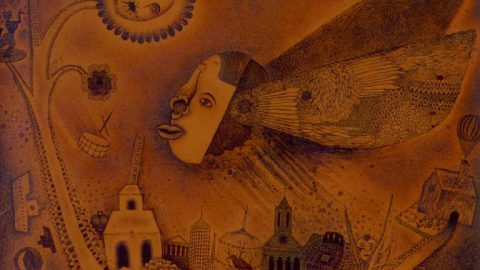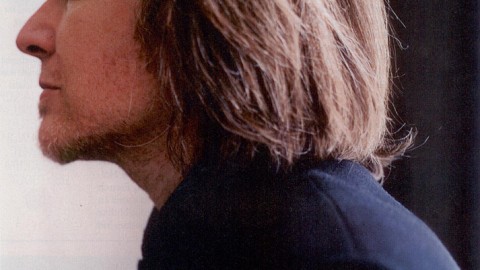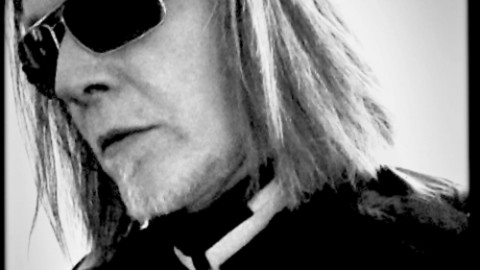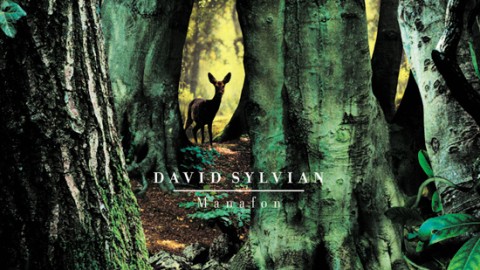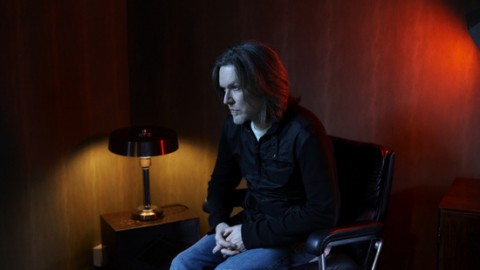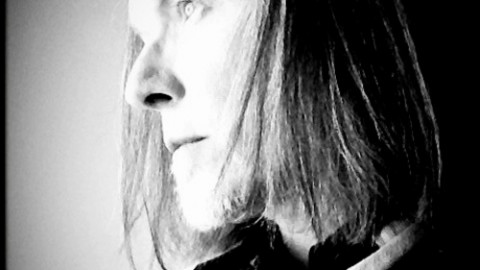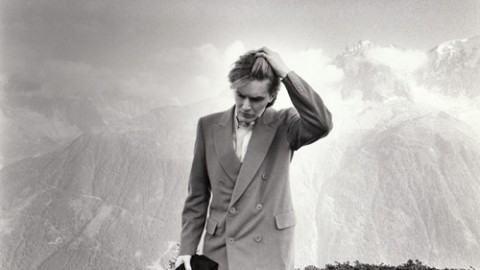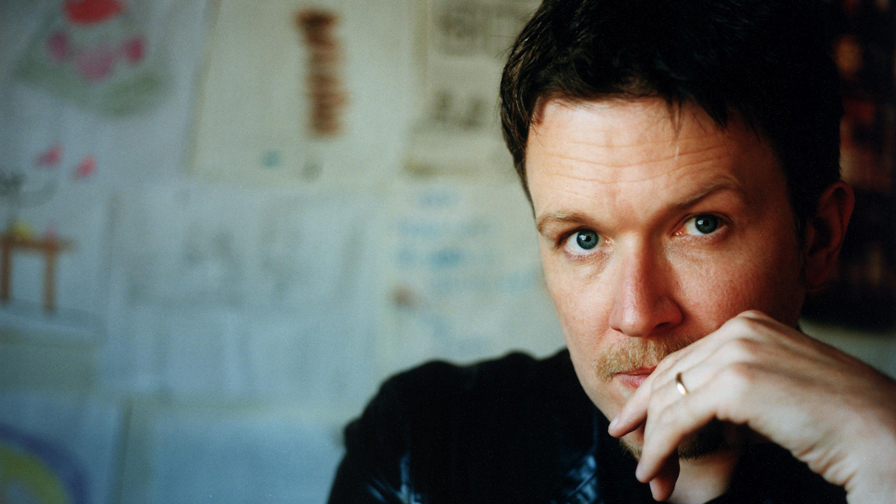
Taken from Shift: Japan-based international online magazine features creative culture.
Interview and Text: Anthony Augendre
Photo: Ingrid Chavez
Most of people, probably know David Sylvian for the unforgettable voice that illustrated “Forbidden colors” the song by Ryuichi Sakomoto, the soundtrack of the motion picture “Merry Christmas Mr. Lawrence“. Other people know him for being the ex-Japan singer. But Sylvian is far more than that. He’s maybe one of the best song writer for ages. He’s able to conjugate the elegance of his compositions with introspective lyrics.
Five years of silence separate us from “Secret of the beehive” to “Dead bees on a cake“. A metaphors that hides the truth of David Sylvian; the quest of the perfect song slowly becomes the quest for purity for him. We met someone that have just realized the symbiosis between his art and his spiritual evolution. A great encounter.
There’s a legend about your work. It is said that you are really a perfectionist and that your record company is always obliged to steal your tapes before you finish your recording. Is it true or not?
(Laughs) Am I a perfectionist? Yes I am! To a large degree. At least that’s everybody tells me so I’m beginning to think it’s true. What is happened in the past is that I worked on material for as long as I possibly can until the budget for the recording has basically run out. At that moment in time I have to make the best of what I have to hand. It’s not always the album that I have intended to make that finally gets released. For example “Secrets of the beehive” there’s pivotal, a center piece of the album that is missing. The pivotal compositions if you like around which the others revolved. And it was never completed in time. Sometimes I feel that the work has to be reconstructed in some way. They are incomplete as far I’m concerned. I’m not giving the opportunity to finishing them. People often willing to let me great a financial assistance to complete the work. So I accept that fact sometimes it’s pretty difficult to let your work go when you know it’s not a 100 percent there for you. But it gains a life of its own. You know there are people that think “Secrets of the beehive” is my strongest album, most personal album and people who like to in a very intense way I think. It works on some ” ” but it wasn’t my original intention. My original intention was not a different album but as I said the pivotal center point is missing and one day I would like to reconstruct the album as I originally intended it.
And I can say that about other projects I’ve worked on I find they are incomplete some degree. It may just be a remix that I wanted to do, I wasn’t happy with a particular mix either a particular track. But nevertheless I would like to always been able to see the project through to the end as I have done with “Dead Bees On A Cake”. I’ve taken my time there was no financial constraints. I could just keep working until I would felt I was happy with it.
Who can give some advice to tell you that your work is quite finished?
Nobody I make that decision myself.
Did you find the “Secret of the beehive”, could it be Death?
For me it was more of a, I guess, a sociological phenomenon. Like the Iraqi at the beehive. I guess I was thinking more in terms of having spiritually… To politically it is. It’s just a concept that appeal to me and somehow inform the work that I was making at the time. So it’s not something that I’m personally going to find. It’s certainly something you embrace in your own life. And you can recognize somebody, something or someone or some God or however. You wish to interpret your own life as the object of your devotion as something that represents the goal. That’s the way I try to adapt it in my life.
And what about the concept of death? The fact that you find “Dead bees on a cake after “The secret of the beehive” Is it a positive way to interpret death, like the idea of rebuilding something or improving your knowledge of life?
In the context of the new album, the metaphor of the bees changed. I lived with the title for sometime I didn’t really understand the significance until later on to the out of stage of the recording process. The album was dealing with the things of love and devotion and divine intoxication. I was looking for a title that reflected that but not in an obvious way. I didn’t want to be dogmatic about it. I found that the title of the album began to represent that for me in some oblique way. The bees began to represent the eagle and the cake the object of desire. And so it’s the eagle that’s dying and merging with the object of desire. This is a concept that spoke over a great deal on a spiritual path. You can find it on many texts as being the ultimate goal, the liberation from the eagle. That’s what it began to represent to me.
Is there an important role of the lyrics. Do you work more on lyrics or compositions?
They are all equally important. I don’t place one about the other.They are very much apart of one another. I don’t like to separate them.
Is there an easiest aspect to develop? Is it easy for you to write the lyrics that reflects your feelings?
It’s not difficult to write a song. It’s very easy to sit down and just write for the sake of writing. What is difficult is to write a piece of music that has relevance to you the writer and that resonate to some perform way in your life. And that’s the difficult part. But the music and the words seem to come relatively easy when the time is right. There’s not a struggle generally. The writing stage is probably most exhilarating by the whole process and it tends to happen quite naturally, quite quickly.
Do you that your compositions are a timeless music? You don’t care about the last trend, the superficial aspect of music industry and what you could have done it five years before or maybe ten years after?
It’s hard for me to say. Could I have made this album five or ten years before the answer is no because of the subject matter. Experience did allowed me to write about the subject matter. So that place is at a moment of time for me. I do try to create a music that the individual can adapt in their own life in some ways. In other words this album is clearly autobiographical but I wouldn’t want people to come to the album to view that melly autobiographical. That is not a strength I would be a witness I think. The point is I try to leave the piece open to such an extent that the individual can adapt the work to their own life. At that point the work takes a life on its own and in that sense it gives a new life every time somebody becomes attached to it. That would make it timeless. If people over and over again came into contact with the work and breathe new life into it through having communion with the work. We have to approach work in an inspired way. As listeners, readers. It’s not a passive act. That has the power to make it timeless.
Your musical path is full of musical encounters. What was the most important one?
Every encounter has a certain quality. I would say is important to me. Some encounters grow and mature with a period of time. I had no idea when I met Ryuichi in 79 I still be working with him 20 years later. We work well over the years, yes, and consistently. I see the partnership going on into the future. But it’s always strange, each time could be the last time we collaborate really. We don’t look to one another as collaborative partners that intend to going. Our collaboration has matured over the years and continue to evolve. And yeah he is becoming the most important collaboration that I have musically.
What about Holger Czukay?
Holger is a dear friend. I benefited it from working with him enormously I think. Yes improvisation, that would have been the first time I touch upon it. I touch the notion of improvisation in the context of my work. When I worked with Holger that area of work just grew in significance for me because it is obviously an area he’s been working for many years or had been working for many years with Can or his own project. So his improvisation methods of writing and recording became very fascinating for me and influenced not just the project we did together but the Rain Tree Crow project that followed on. And still influenced the work that I do in some degree. That’s the main experience that I have taken away from working with Holger.
You’ve been involved into plastic arts. You did exhibitions with Russell Mills. He realized his first musical experience on Time Recording, you did collaborate on it. Do you think that its a natural process that gives opportunity to musicians and plasticities to work both on sound and pictures esthetic?
Yes I think it’s quite natural to cross over these days. It’s quite a challenge. I’m sure Russell found a challenge to work as a musician. Because he’s really not a musician. Given the opportunity to make an album is too good to refuse. He came out with the concept that would work for him. It’s the same way as myself and the visual arts. Suddenly you are offered an exhibition base, it’s not something you plans. But there you are you are given the opportunity to create an installation and you didn’t turn your back on it because it’s just a too good opportunity to turn down. This area of work I don’t actively see. I’m really happy to work in music because I work so slowly. There are so many ideas, so many pretentious projects that get left behind. In a sense there is not enough time to complete all the work that I want to do in music. Should somebody come to me tomorrow and offer me an exibition place, I would not refuse it cause it’s too much of a challenge for me. I really enjoy working in the visual arts. It’s a challenge to create and develop a vocabulary of mine. I see Russell doing the same thing in music.
There’s a woman voice on the song “Praise” ion the last album. It seems to be a religious song, is it the case?
Yes. It is sung in Sanskrit. It is a song of praise to the three aspect of the divine mother. The singer is an Indian holy woman by the name of Shree Maa. Should I say something about her?
Yes of course!
She was born in India into a family of renom but in a early age she just walk away from all that to walk into the forest of India and turn her back on materialistic life and devoted herself to God. She lived in the Himalaya for a period of time. She became Shree Maa, this holy woman through devotion. She came to America in 1994 she had a very reclusive life, very humble existence, it still does. In 1997 she undertook a first trip across America. She came to stay into our house with 40 people and transform our house into an hasram. It was a place of worship. At the end of each morning she would sing the song. Her voice resonated through our house it was magnificent. It was so deeply moving. I have a studio in house and she very gracefully allowed us to record her. We captured something that was a very important document for us. It became part of our practice we would listen to that piece over and over again on daily basis. And ultimately it felt right to include this part of the album as Shree Maa seems to be the example of the goal. She can sing with such clarity of devotion just purity. She’s the vocal point of the album, the pinnacle if you like.
Did you think you did a gift for us by recording her?
She’s the Gift. She’s giving offer herself to everybody. It’s her grace.
What did you discover from this Oriental mysticism?
The point for me was to find a discipline with which to work in life on a daily basis. I was and still am very interested in Buddhism particularly Zen Buddhism. And that is informed my practice. Working alone because I ‘ve never had a teacher, the practice became very dry and ultimately didn’t informed my life enough. When I met Ingrid (ED : Ingrid Chavez David’s wife) we kind of made a pact that we were going to explore that aspect in our life together. It was a common goal between us. We start to see different teachers. It gives us a focus and gives us a discipline and somebody to constantly inspire the practice. And in part of the practice includes the notions of surrender which I talk about in the album. To surrender not being an once on life time act. You surrender and it’s over is not that simple. Surrendering is something that needs to be confirm and reconfirm with every breath. So it became an act of meditation, an act of will, an act of consciousness. It’s a means of maintain consciousness. That is very much the kind of path I have chosen to take. It also embrace aspects of hindouism. Either I wouldn’t call myself a buddhist or an hinduist. But my practice embraces aspects of both.
Tell us a bit more about the cover design of your last album. We know that you pay a particular attention to the layout?
It’s an etching by a Japanese artist Shinya Fujiwara. He did the photographs for the Rain Tree Crow album cover. He’s a well known photographer in Japan and essayist and critic but he is also a very good visual artist in terms of his graphics. So he’s done an original work for me for the cover. It’s a very beautiful cover. Russell Mills is designed it Yuko and I had directed it, there’s photograph by Anton Corbijn. It’s printed on gold.
It’s your team!
Yes it’s my team (laughs) All of about friends working together and produce something actually is extraordinary beautiful extraordinary beautiful. It’s a lovely cover I’m really happy with it.
Original article
